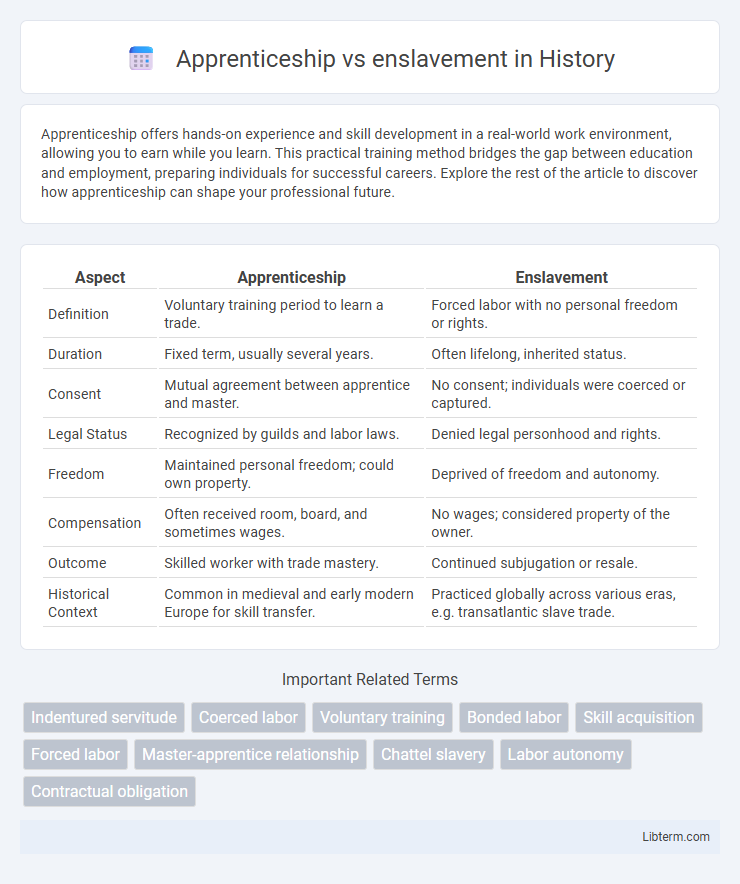Apprenticeship offers hands-on experience and skill development in a real-world work environment, allowing you to earn while you learn. This practical training method bridges the gap between education and employment, preparing individuals for successful careers. Explore the rest of the article to discover how apprenticeship can shape your professional future.
Table of Comparison
| Aspect | Apprenticeship | Enslavement |
|---|---|---|
| Definition | Voluntary training period to learn a trade. | Forced labor with no personal freedom or rights. |
| Duration | Fixed term, usually several years. | Often lifelong, inherited status. |
| Consent | Mutual agreement between apprentice and master. | No consent; individuals were coerced or captured. |
| Legal Status | Recognized by guilds and labor laws. | Denied legal personhood and rights. |
| Freedom | Maintained personal freedom; could own property. | Deprived of freedom and autonomy. |
| Compensation | Often received room, board, and sometimes wages. | No wages; considered property of the owner. |
| Outcome | Skilled worker with trade mastery. | Continued subjugation or resale. |
| Historical Context | Common in medieval and early modern Europe for skill transfer. | Practiced globally across various eras, e.g. transatlantic slave trade. |
Defining Apprenticeship and Enslavement
Apprenticeship is a structured training system where individuals learn a trade or skill under the guidance of a skilled mentor, emphasizing mutual consent, education, and eventual career advancement. Enslavement involves the forced labor and control of individuals without their consent, characterized by the denial of freedom and basic human rights. The fundamental difference lies in apprenticeship fostering voluntary skill development, while enslavement is rooted in coercion and exploitation.
Historical Contexts of Apprenticeship and Slavery
Historical contexts of apprenticeship and slavery reveal fundamentally different social and economic systems; apprenticeships were formalized training arrangements where young individuals learned trades under skilled masters, typically with legal protections and prospects for social mobility. In contrast, slavery was a system of forced labor characterized by ownership, lack of freedom, and exploitation, with enslaved people deprived of rights and autonomy. While apprenticeship aimed to develop skills for future independence, slavery reinforced systemic oppression and lifelong servitude.
Legal Boundaries: Rights vs. Restrictions
Apprenticeship laws establish clear legal boundaries that guarantee apprentices' rights to fair wages, education, and safe working conditions while restricting exploitative practices. Enslavement, by contrast, involves the complete denial of personal freedoms and legal rights, subjecting individuals to forced labor without compensation or protection. Legal frameworks distinctly separate apprenticeships as regulated, consensual training arrangements from the unlawful and inhumane conditions inherent in enslavement.
Economic Motivations Behind Each System
Apprenticeship and enslavement differ fundamentally in economic motivations, with apprenticeship driven by skill development and future labor market integration, while enslavement relies on forced labor to maximize short-term productivity and profit exploitation. Apprenticeships invest in human capital, aiming for long-term economic gains through specialized workforce training and increased productivity. Enslavement prioritizes immediate economic extraction without regard for the enslaved individuals' development or well-being, leading to unsustainable labor practices and profound social costs.
The Role of Consent and Coercion
Apprenticeship is defined by mutual consent where the apprentice voluntarily agrees to learn skills under the guidance of a mentor, ensuring a fair exchange of labor for knowledge. In contrast, enslavement involves coercion, denying individuals the freedom to choose and forcing labor without compensation or rights. The presence or absence of consent distinctly separates apprenticeship as a legitimate educational relationship from enslavement as a human rights violation.
Educational Outcomes and Skill Development
Apprenticeship provides structured skill development through hands-on training combined with theoretical knowledge, leading to measurable educational outcomes and professional competency. Enslavement, by contrast, denies individuals access to formal education and personal growth, resulting in severely limited skill acquisition and stunted intellectual development. The contrast highlights apprenticeships as a vital system for fostering skilled labor and economic empowerment, unlike enslavement, which suppresses human potential and educational progress.
Social Mobility and Long-term Opportunities
Apprenticeship provides structured skill development and fosters social mobility by offering individuals pathways to skilled professions and higher earning potential. In contrast, enslavement restricts personal freedom, eliminates opportunities for advancement, and perpetuates systemic inequality. Long-term opportunities in apprenticeship lead to economic empowerment, while enslavement results in generational poverty and social stagnation.
Psychological Impacts on Individuals
Apprenticeship fosters skill development, autonomy, and confidence, positively influencing psychological well-being by promoting a sense of purpose and self-efficacy. Enslavement inflicts trauma, chronic stress, and learned helplessness, often causing long-lasting mental health issues such as anxiety, depression, and post-traumatic stress disorder. The stark contrast in psychological impacts highlights the importance of freedom and agency in human development and mental resilience.
Modern Perspectives and Misconceptions
Modern perspectives distinguish apprenticeship as a structured, voluntary learning process fostering skill development and personal growth, contrasting sharply with enslavement, which involves coercion and exploitation without consent or freedom. Misconceptions often blur these boundaries, mislabeling strict apprenticeships as forms of enslavement, despite legal protections and mutual benefits inherent in legitimate apprenticeships. Contemporary discourse emphasizes the importance of clear ethical standards, labor rights, and informed consent to preserve the integrity and value of apprenticeship programs.
Ethical Debates: Lessons for Today
The ethical debates surrounding apprenticeship versus enslavement highlight the importance of consent, autonomy, and fair treatment in labor relationships. Apprenticeships involve voluntary skill acquisition with agreed terms, fostering personal growth and economic opportunity, whereas enslavement entails coercion, deprivation of freedom, and systematic human rights abuses. These lessons stress the necessity of ethical labor practices and legal safeguards to prevent exploitation in modern workforce systems.
Apprenticeship Infographic

 libterm.com
libterm.com